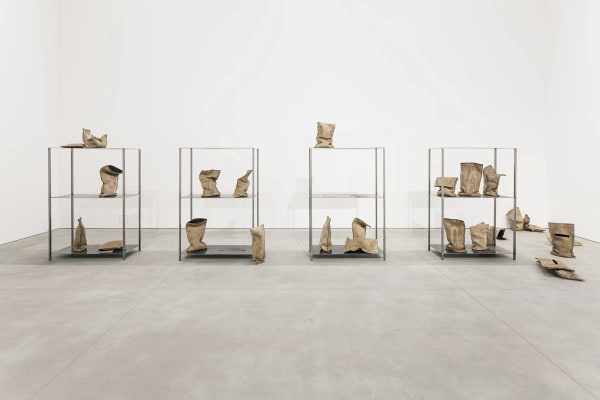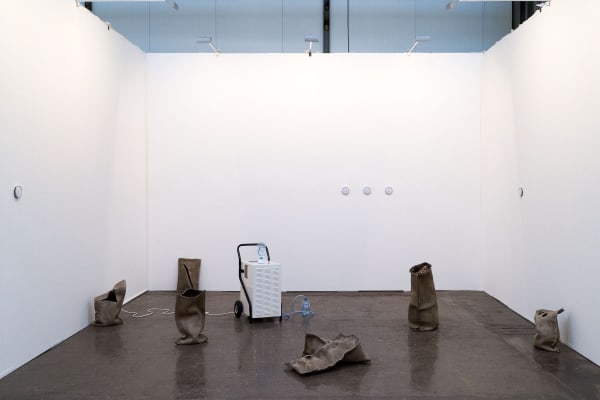Adrien Missika, Demain, Stabilisation
Düsseldorf, Germany
Art Düsseldorf Prize for Post-Lehman Presentation 2017
Galeria Francisco Fino presents a new body of work by Adrien Missika that draws on the artist's continuous reflections on ecology, metabolism and our relationship with the environment. These series of sculptural works operate as narrative structures, combining diverse artistic strategies that explore humour within conceptual art perimeters, the subtlety of existential poetics through a performative revision of archival practices as an open form.
Better Safe Than Sorry takes the form of an open archive, including a series of custom-made soil bags shaped in concrete canvas, a patented material used for ditch lining and the construction of slopes or bunkers. Suggesting the form of a contaminated archive susceptible to mutation, each bag holds a rich quantity of soil, with one containing a variety of open pollinated seeds that can be collected by the visitor, inciting the cultivation and propagation of non-patented seeds. Treating soil as a rare earth material, each bag is unique in shape, some displaying cuts or intersections that allude to dissemination and potential accidental forms of fertilisation.
The Relative Naive is a mechanic device for climate stabilisation that works through condensation and mist dispersal. Water is contained in a bottle attached to an apparatus for humidity extraction, representing a closed circuit. This witty prototype geo-engineering scale model, while underlining the absurdity of climatised spaces, represents the artificial conditions of conservation archives. It leaves the space with 50% humidity, providing an atmospheric relief given the arrival of the rainy season. Directly addressing the urban planning efficiency systems and new thermodynamic strategies of cities, The Relative Naive reminds us that climate control comes from a position of fake neutrality, a class discriminatory attempt to erase discomfort for some, while creating other sorts of entropic responses.
Plus ou Moins (Psychometric Portrait) includes a series of wall sculptures of modified hygrometers inscribed with different personal emotions: belief, delusion, melancholy, paranoia, distrust. Switching psychrometrics – the measurement of humidity – with psychometrics – the categorisation of mental capacities and processes – we are taken through a survey of one's mood swings and fragilities, and their fluctuations with the changing weather. These words can be read in the calligraphic inscriptions traced on the frontal parts of the hygrometers, leaving a subtle imprint of a human hand in this piece of industrial technology, where the measurements’ results depend, as if by magic, on the reaction of a hidden human hair. The perfected quality of the professional calligrapher mirrors that of an enchanted printer, or an industrial foreteller. We are introduced to a bionic gesture that appeals, as well, to a machinic subjectivisation of the viewer.



